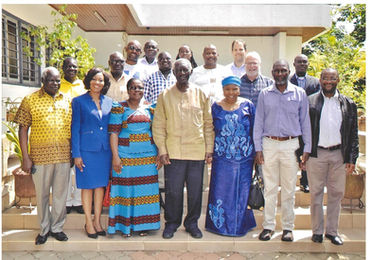

Interparty Dialogue Platform
Facilitated by President Thabo Mbeki the three political parties in Zimbabwe, MDC-T, ZANU PF and MDC-M sign the
historic Global Political Agreement, (GPA) making way for a Government of National Unity in 2009.
Since inception on 11 November 2002, Zimbabwe Institute has conducted programming to facilitate dialogue among Zimbabwe's political parties. Following the disputed elections of 2008, Zimbabwe Institute provided support to the mediating role between the contesting parties to enable dialogue which eventually led to the resolution of the impasse through the signing of the Global Political Agreement and the establishment of a Government of National Unity.
Subsequently, Zimbabwe Institute was tasked to the Secretariat of the Joint Monitoring and Implementation Committee, JOMIC, in 2009, which operated in Zimbabwe's ten provinces. JOMIC was set up to facilitate policy tracking and implementation throughout the tenure of the Government of National Unity with a specific mandate to monitor implementation of the GPA.
Following the JOMIC platform, ZI continued to facilitate Inter-Party Dialogue under the name, Zimbabwe Political Parties Dialogue, (ZPPD), working with the three political parties with representation in Parliament, namely, Movement for Democratic Change, MDC-T (led by Morgan Tsvangirai), its small splinter group, the Movement for Democratic Change, MDC-M, (led by Arthur Mutambara), and the ruling Zimbabwe African National Union – Patriotic Front (led by Robert Mugabe). Through consistent, interactive and collaborative work on the ZPPD, the parties developed a Code of Conduct for Political Parties, Candidates and other Stakeholders, a major achievement of the dialogue process, which was promulgated into law as the Fourth Schedule in the Electoral Act, on 28 May 2018 and was officially launched the same year at a national event attended by regional and international delegates. As an expression of their desire for consensus based approaches, the political parties agreed to launch the Peace Pledge as a symbol of peace in upcoming elections beginning with the 2018 harmonised elections.

A delegation of the three political parties with representation in Parliament meet with former President John Kufuor in Ghana.
A group photo of the interparty dialogue platform comprised of representatives from the three political parties, MDC-T, ZANU PF and MDC-M and key stakeholders including funding partners and staff from Zimbabwe Institute.
Parliamentarians and CSO representatives at the Electoral Reform Stakeholder Dialogue in Bulawayo in June 2017.
Ugandan delegates participating at the interparty dialogue meeting in Harare.
A group photo of a 15 member delegation from the Interparty Organization for Dialogue, (IPOD), representing four political parties from Uganda with representatives of political parties from the three political parties in Zimbabwe after a workshop aimed at sharing lessons and strengthening interparty dialogue in the two countries held in October 2017..

The 2023 Peace Pledge signing ceremony in Harare.
The Code of Conduct and Peace Pledge
The Code of Conduct for Political Parties, Candidates and Other Stakeholders, “promotes conditions which are conducive to free and fair elections and helps to create a climate of tolerance in which electioneering activity may take place without fear or coercion, intimidation or reprisals”.
This commitment by political parties is further demonstrated through the Peace Pledge which is drawn from the Code of Conduct, as a summary of political party commitments to peaceful conduct before, during and after elections. ZI has worked with political parties contesting in elections since 2018, alongside key stakeholders such as the National Peace and Reconciliation Commission (NPRC) in 2018, and the church through the Zimbabwe Heads of Christian Denominations, (ZHOCD), in 2023 to launch and popularize the Peace Pledge across all of Zimbabwe's ten provinces.

The 2023 Peace Pledge signing ceremony in Mutare.

The 2023 Peace Pledge signing ceremony in Gweru.

The 2023 Peace Pledge signing ceremony in Bulawayo.
|Innovation |Partnership |Sustainability



